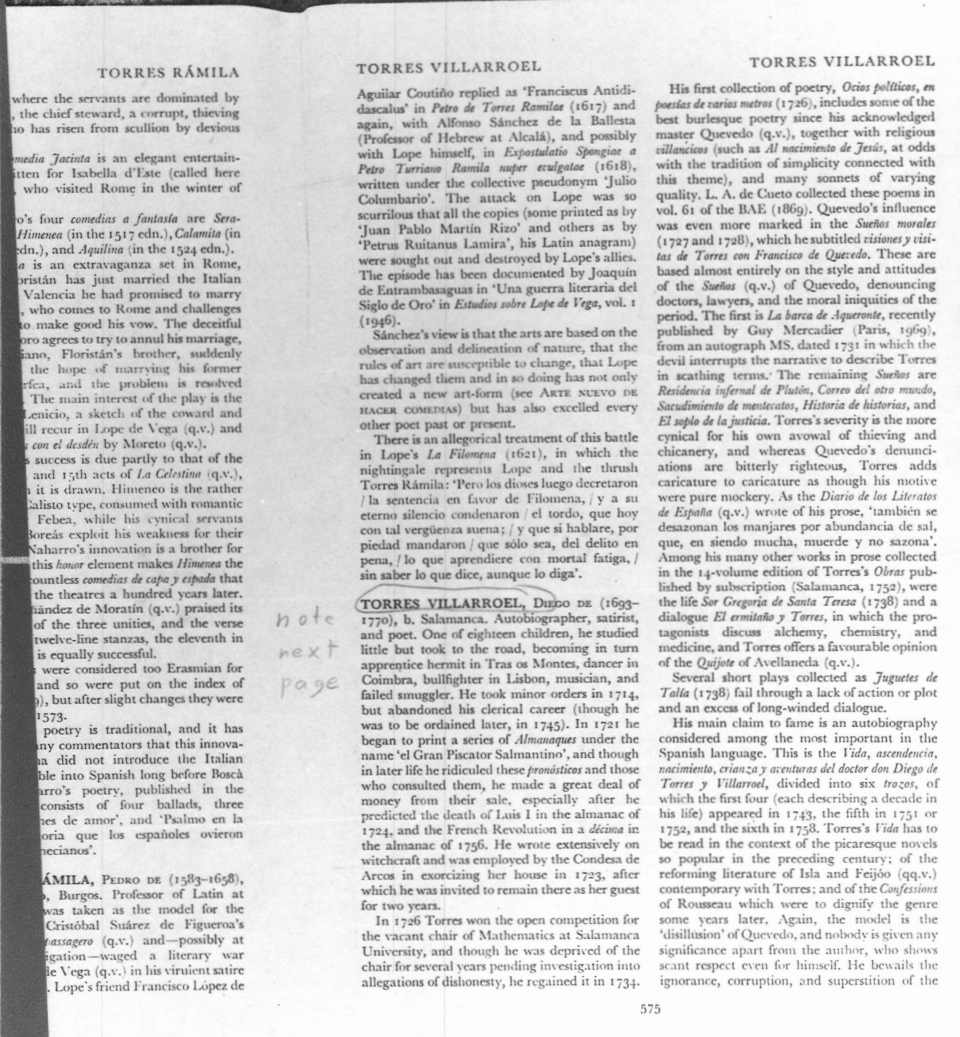<harbor.klnpa.org/california/islandora/object/cali%3A1147>
Diego de Torres Villarroel

TORRES VILLARROEL, Dieco de (1693- 1770), b. Salamanca. Autobiographer, satirist, and poet. One of eighteen children, he studied little but took to the road, becoming in turn apprentice hennit in Tras os Montes, dancer in Coimbra, bullfighter in Lisbon, musician, and failed smuggler. He took minor orders in 1714, but abandoned his clerical career (though he was to be ordained later, in 1745). In 1721 he began to print a series of Almaiiaques under the name ‘el Gran Piscator Salmantino’, and though in later life he ridiculed thesepronoslicot and those who consulted them, he made a great deal of money from their sale, especially after he predicted the death of Luis I in the almanac of 1724, and the French Revolution in a decur.a in the almanac of 1756. He wrote extensively on witchcraft and was employed by the Condesa de Arcos in exorcizing her house in 1723, after which he was invited to remain there as her guest for two years.
In 1726 Torres won the open competition for the vacant chair of Mathematics at Salamanca University, and though he was deprived of the chair for several years pending investigation into allegations of dishonesty, he regained it in 1734.
His first collection of poetry, Odos politicos, tn poesias de tarios metros (1726), includes some of the best burlesque poetry since his acknowledged master Quevedo (q.v.), together with religious lillancicos (such as Al nacimiento de Jesus, at odds with the tradition of simplicity connected with this theme), and many sonnets of varying quality. L. A. de Cueto collected these poems in vol. 61 of the BAE (1869). Quevedo’s inllucnce was even more marked in the Suehos morales (1727 and 1728), which he subtitled visionesy visi- las de Torres con Francisco de Queiedo. These arc based almost entirely on the style and attitudes of the Sueiios (q.v.) of Quevedo, denouncing doctors, lawyers, and the moral iniquities of the period. The first is La barca de Aqueronte, recently published by Guy Mcrcadier (Paris, 1969), from an autograph MS. dated 1731 in which the devil interrupts the narrative to describe Torres in scathing terms.’ The remaining Sueiios are Residenda infernal de Pluton, Correo del otto mundo, Sacudimiento de menlecatos, Historia de historias, and El soplo de la justicia. Torres's severity is the more cynical for his own avowal of thieving and chicanery, and whereas Quevedo’s denunciations arc bitterly righteous, Torres adds caricature to caricature as though his motive were pure mockery. As the Diario de los Literates de Espaila (q.v.) wrote of his prose, ‘tambicn sc desazonan los manjares por abundancia de sal, que, cn siendo mucha, muerde y no sazona’. Among his many other works in prose collected in the 14-volumc edition of Torres’s Obras published by subscription (Salamanca, 1752), were the life Sor Gregoria de Santa Teresa (1738) and a dialogue El ermitailo y Torres, in which the protagonists discuss alchemy, chemistry, and medicine, and Torres offers a favourable opinion of the Qjiijote of Avellaneda (q.v.).
Several short plays collected as Juguetes de Talia (1738) fail through a lack of action or plot and an excess of long-winded dialogue.
His main claim to fame is an autobiography considered among the most important in the Spanish language. This is the Vida, ascendencia, nacimiento, crianzay aienturas del doctor don Diego de Torres y Villarroel, divided into six trozos, of which the first four (each describing a decade in his life) appeared in 1743, the fifth in 1751 or 1752, and the sixth in 1758. Torres’s Vida has to be read in the context of the picaresque novels so popular in the preceding century; of the reforming literature of Isla and Feijoo (qq.v.) contemporary with Torres: and of the Confessions of Rousseau which were to dignify the genre some years later. Again, the model is the ‘disillusion’ of Quevedo, and nobody is given any significance apart from the author, who shows scant respect even for himself. He bewails the ignorance, corruption, and superstition of the ...
